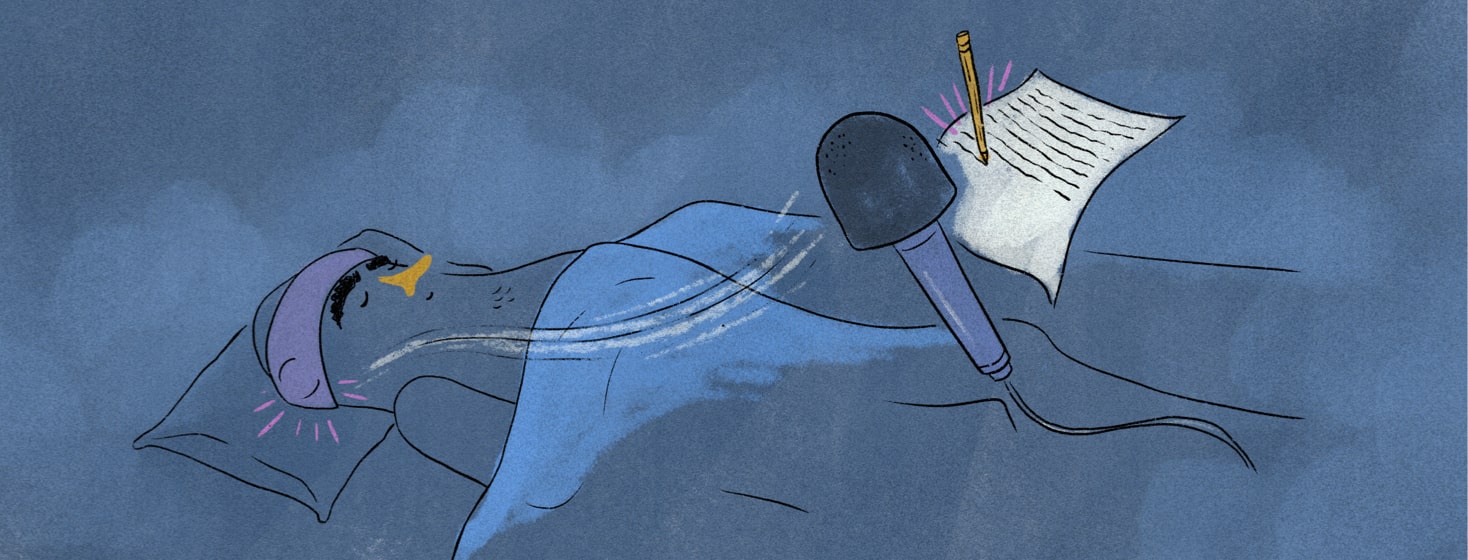Might ASMR Help You Fall Asleep More Easily?
This article was initially meant to be a review of the Sleep Cove Podcast, a well-liked, highly downloaded sleep-themed podcast that uses sleep hypnosis, meditations, and bedtime stories to help you relax so you can fall asleep.1
In short, I would recommend Sleep Cove. I found that every night when I listened to it, I was lulled to sleep before the episode ended. Christopher, a hypnotherapist, is the voice behind the podcast.
It’s no surprise that a well-trained hypnotist would project an easy-listening voice with a distinct rhythm, pitch, and tone. I found his voice pleasant, the messages comforting, and the whole experience genuinely relaxing.
We all know people with these amazing voices. Christopher is one of them. His soft voice – not quite as soft as a whisper – holds a timbre I found quite musical.
But Christopher’s voice reminded me of something else: ASMR.
The power of a whisper
Its almost-whisper-like quality reminded me of the time I listened to an episode from another podcast a few years ago: Other People’s Lives.
Soundcloud introduced that episode, “The World of ASMR,” in this way: “Does someone whispering sounds and phrases into your ear relax you, or do you hate it? Greg & Joe speak with an up-and-coming ASMRtist.”2
The hosts led the episode with their first impressions before launching an interview with the guest, an ASMR practitioner in the UK. At the end, they held a debrief to gauge whether they’d changed their first impressions on the topic.
Even though it was a podcast, I could practically see Greg and Joe squirming on the other end of the mic as they described listening to ASMR tracks.
Some people love ASMR. Some experience an erotic response to it. Meanwhile, others can’t tolerate it, and some may never experience ASMR at all.
What is ASMR?
ASMR stands for Autonomous Sensory Meridian Response, a kind of sensation in which the brain tingles in response to certain sensory stimuli, most commonly (but not limited to) audio or visual encounters.
However, ASMR also describes the media created to trigger moments of ASMR.
On the Internet, you can find literally thousands of ASMR videos and audio files to listen to if you’re interested in achieving this effect through digital means. Be prepared to enter a strange media rabbit hole if you do.
Examples of ASMR
Some of the most highly sought ASMR triggers are auditory: whispering or blowing sounds, the sound of scratching or writing, page-turning or tapping sounds, crinkling, chewing, humming, buzzing, and more. A common example many might relate to? The popping of bubble wrap, which has both physical and auditory elements. The feeling itself, of pressing against the thin plastic until it bursts into a bright pop, is satisfying — some would even say relaxing.
No wonder so many podcasts and YouTube channels are now devoted to ASMR. One can tune in anywhere with a set of headphones, sit back, and enjoy the trigger of this desired response.
Why do people use ASMR?
Anecdotally, ASMR elicits feelings of comfort, calm, happiness, even drowsiness following the initial spine-tingling effect. For others, it’s physically arousing, even if it occurs without touch at all. In any case, when someone finds a trigger for ASMR that helps them achieve one of these desirable states, they often seek it out as a tool for relaxing.
Very little research on ASMR exists, so the science behind this phenomenon is yet to be established. But one study did conclude that ASMR could be a “reliable and psychologically-rooted experience that may have therapeutic benefits for both mental and physical health.”3
ASMR for insomnia
As I listened to that episode on ASMR, I realized that it offers a sleep wellness component worth considering.
First described in 2010, ASMR has since become a popular go-to approach for insomnia relief. Experts at the Sleep Foundation think ASMR activates brain regions associated with the hormones dopamine and oxytocin, which both bring calm and induce sleep. They report that 82 percent of all people who use ASMR use it specifically to fall asleep.4
Will ASMR work for me?
Should you try ASMR? It can’t hurt. You’ll know immediately whether it works for you just by listening. If you do so, make sure you’re reclined in a dark, quiet room, and try using stereo headphones that lay flat against the head.
Also, don’t forget to practice good sleep hygiene when engaging in ASMR! Avoid looking at handheld devices that emit blue spectrum light, as this can prevent you from falling asleep.
If you like the experience and find it calming, you might use it to improve your ability to fall asleep, especially if you’ve already tried every other thing and still find yourself wide awake at night.

Join the conversation